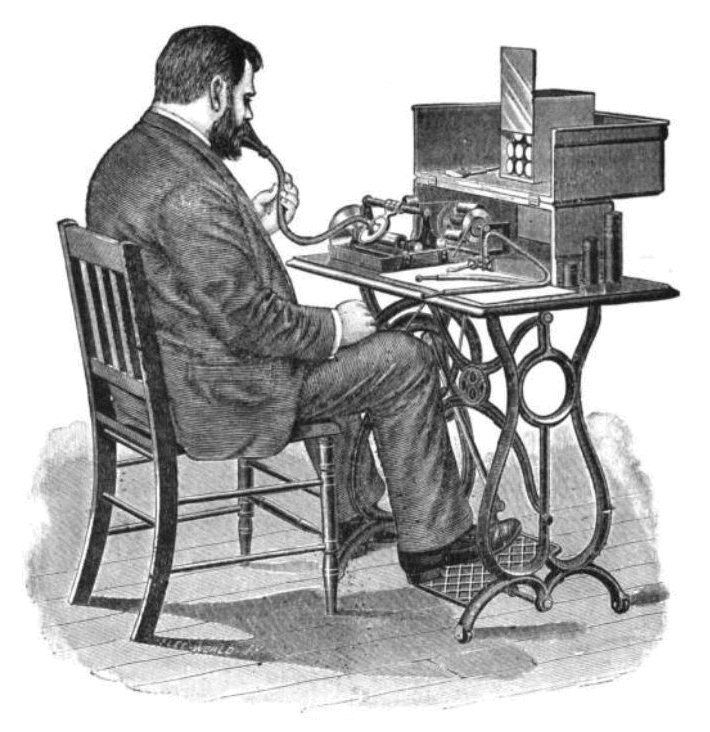 Old habits are hard to brake. Many doctors are dependent on an old technology, the dictaphone, to create their notes despite many advantages of writing text themselves. Younger doctors, raised with laptops and smartphones in immediate reach, write as fast as they talk and wouldn't touch a dictaphone with a large pole.
Old habits are hard to brake. Many doctors are dependent on an old technology, the dictaphone, to create their notes despite many advantages of writing text themselves. Younger doctors, raised with laptops and smartphones in immediate reach, write as fast as they talk and wouldn't touch a dictaphone with a large pole.I commonly hear from colleagues that they can’t imagine writing their own notes because “it’s stupid to have the most expensive workforce doing secretary work” Some argue that they write too slowly and have better things to do than learn typewriting.
So let's look into this, how come some doctors write almost all their notes, what is it that we "writers" have found out?
A medical note contains all relevant information for a patient case and is highly valuable to all caregivers, a little like the black box in airplanes. The note contains details which are easily left out in verbal reports, everyone who has played the whispering game knows this. The emergency department is unique in that a huge amount of valuable information is collected, history of present illness, clinical examination etc. Lots of health personal will be taking care of the patient not only in your ED but the hospital as the patient is admitted. It's obvious that this information must be ready for others to view immediately.
Quality not quantity
Thus, unless your secretary transcribes your dictations immediately you should consider writing your notes.
Patient security is an important issue but as we writers have found out there is lots to gain for the doctor. Seeing text in front of you on the screen gives you much better overview of the case you are describing and helps making the note structured and appropriately detailed. As you learn more about your patient you can modify or add that information directly rather than battling the dictaphone to edit your previous recording. Dictating is mostly an passive activity while writing makes your brain crunch the details, evaluating the pieces bit by bit to create the bigger picture and final conclusions. Thus I feel much more confident in my written notes than those I've dictated.
Having a note immediately ready allows me to use parts of it to copy & paste into associated notes e.g. radiology or clinical request forms. Medical letters can be created instantly and sent away only minutes after the patient has left the ED. This save you the time and hazzle of reading through your note days or weeks later and keeps your list of unsigned documents empty. The feeling of leaving work without unsigned work waiting is truly awesome.
With the rise of e-Patients, a final and ready medical report can be handed directly to the patient who is then better informed and can then easier follow the treatment plan or advice given and therefor less likely to come back unneccessarily to the ED.
But I'm a slow writer!
Learning to write faster is easily achieved and has been covered earlier on this blog. By learning touch typing and doing some training you can easily pimp your typing speed about 1-200%, it's as easy as learning to ride a bike. By writing faster you will also gain great productivity boost in daily life as described in the post above.Since you do a structurized clinical examination and review of systems, templates are great to describe those parts that are normal. There are lots of ways to do this, I have a special document in Google Drive (Docs) with my template texts, with copy & paste I can finish the clinical examination part in less than a minute.
Abbrevations are also a great way to boost your typing speed and learning the most common ones is time well spent.
Voice to speech recognition allows you to create text by speaking to your computer or smartphone. Medical jargon may not be so easily transcribed but increasingly more common are software tools which understand these too.
Finally - you can use the best of both. Write the most important important information such as HPI, clinical examination, assessment and plan and then finish the rest with the dictaphone. Have a Coke AND a Snickers!
Patients are reading your notes
The times they are changing indeed. The public increasingly demands all kinds of information to be open and freely accessed. Sweden is currently adding law giving patients the right to see their medical journals even before the doctor has read them through and signed. This of course has caused a stir amongst doctors but trials have been in patients' favor.My guess is that in 20 years time we will look back and laugh at that medical records once were the doctor's secret. Of course the patient should be totally involved right from the beginning.
This trend is yet another reason for us to start writing more notes with higher quality content, not only for the benefit of our patients but also ourselves.
